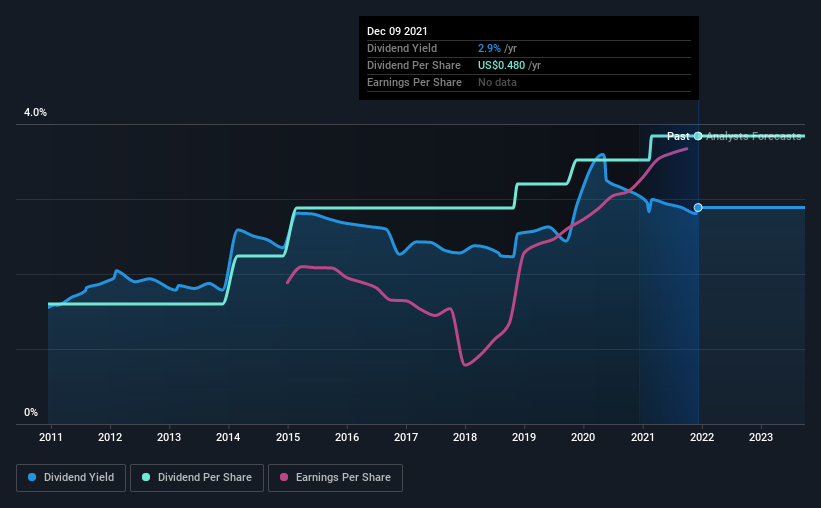Is It Smart To Buy ESSA Bancorp, Inc. (NASDAQ:ESSA) Before It Goes Ex-Dividend?
It looks like ESSA Bancorp, Inc. (NASDAQ:ESSA) is about to go ex-dividend in the next four days. The ex-dividend date occurs one day before the record date which is the day on which shareholders need to be on the company's books in order to receive a dividend. The ex-dividend date is an important date to be aware of as any purchase of the stock made on or after this date might mean a late settlement that doesn't show on the record date. Thus, you can purchase ESSA Bancorp's shares before the 15th of December in order to receive the dividend, which the company will pay on the 30th of December.
The company's next dividend payment will be US$0.12 per share, on the back of last year when the company paid a total of US$0.48 to shareholders. Looking at the last 12 months of distributions, ESSA Bancorp has a trailing yield of approximately 2.9% on its current stock price of $16.63. Dividends are a major contributor to investment returns for long term holders, but only if the dividend continues to be paid. As a result, readers should always check whether ESSA Bancorp has been able to grow its dividends, or if the dividend might be cut.
Check out our latest analysis for ESSA Bancorp
If a company pays out more in dividends than it earned, then the dividend might become unsustainable - hardly an ideal situation. That's why it's good to see ESSA Bancorp paying out a modest 28% of its earnings.
Companies that pay out less in dividends than they earn in profits generally have more sustainable dividends. The lower the payout ratio, the more wiggle room the business has before it could be forced to cut the dividend.
Click here to see how much of its profit ESSA Bancorp paid out over the last 12 months.
Have Earnings And Dividends Been Growing?
Businesses with strong growth prospects usually make the best dividend payers, because it's easier to grow dividends when earnings per share are improving. Investors love dividends, so if earnings fall and the dividend is reduced, expect a stock to be sold off heavily at the same time. Fortunately for readers, ESSA Bancorp's earnings per share have been growing at 18% a year for the past five years.
Many investors will assess a company's dividend performance by evaluating how much the dividend payments have changed over time. ESSA Bancorp has delivered 9.1% dividend growth per year on average over the past 10 years. It's encouraging to see the company lifting dividends while earnings are growing, suggesting at least some corporate interest in rewarding shareholders.
The Bottom Line
Has ESSA Bancorp got what it takes to maintain its dividend payments? Typically, companies that are growing rapidly and paying out a low fraction of earnings are keeping the profits for reinvestment in the business. This is one of the most attractive investment combinations under this analysis, as it can create substantial value for investors over the long run. We think this is a pretty attractive combination, and would be interested in investigating ESSA Bancorp more closely.
Want to learn more about ESSA Bancorp? Here's a visualisation of its historical rate of revenue and earnings growth.
A common investment mistake is buying the first interesting stock you see. Here you can find a list of promising dividend stocks with a greater than 2% yield and an upcoming dividend.
Have feedback on this article? Concerned about the content? Get in touch with us directly. Alternatively, email editorial-team (at) simplywallst.com.
This article by Simply Wall St is general in nature. We provide commentary based on historical data and analyst forecasts only using an unbiased methodology and our articles are not intended to be financial advice. It does not constitute a recommendation to buy or sell any stock, and does not take account of your objectives, or your financial situation. We aim to bring you long-term focused analysis driven by fundamental data. Note that our analysis may not factor in the latest price-sensitive company announcements or qualitative material. Simply Wall St has no position in any stocks mentioned.

